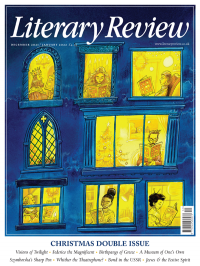Nick Hunt
Vertical Imperialism
The Hunt for Mount Everest
By Craig Storti
John Murray 301pp £20
My great-uncle’s string vest hangs in an inn in Snowdonia. It is displayed in a cabinet in the Pen-y-Gwryd Hotel, along with ropes, a woolly hat, a tin mug, crampons, an umbrella and other memorabilia from the 1953 Everest expedition, of which the wearer of that vest, John Hunt, was the leader. These holy relics of alpinism loomed large in my childhood, as did my great-uncle’s tales of mysterious footprints in the snow and yeti howls carried on the wind. That iconic climb, when Edmund Hillary and Tenzing Norgay planted the Union Jack on top of the highest mountain on Earth, formed a semi-mythologised backdrop to the burgeoning of my own desire for adventure.
The story of Mount Everest is often told as though it ended there, with the first successful ‘conquest’ of 29 May 1953, and began only three decades before, with the 1921 British reconnaissance expedition (the members of which included the doomed George Mallory). In The Hunt for Mount Everest,

Sign Up to our newsletter
Receive free articles, highlights from the archive, news, details of prizes, and much more.@Lit_Review
Follow Literary Review on Twitter
Twitter Feed
It wasn’t until 1825 that Pepys’s diary became available for the first time. How it was eventually decrypted and published is a story of subterfuge and duplicity.
Kate Loveman tells the tale.
Kate Loveman - Publishing Pepys
Kate Loveman: Publishing Pepys
literaryreview.co.uk
Arthur Christopher Benson was a pillar of the Edwardian establishment. He was supremely well connected. As his newly published diaries reveal, he was also riotously indiscreet.
Piers Brendon compares Benson’s journals to others from the 20th century.
Piers Brendon - Land of Dopes & Tories
Piers Brendon: Land of Dopes & Tories - The Benson Diaries: Selections from the Diary of Arthur Christopher Benson by Eamon Duffy & Ronald Hyam (edd)
literaryreview.co.uk
Of the siblings Gwen and Augustus John, it is Augustus who has commanded most attention from collectors and connoisseurs.
Was he really the finer artist, asks Tanya Harrod, or is it time Gwen emerged from her brother’s shadow?
Tanya Harrod - Cut from the Same Canvas
Tanya Harrod: Cut from the Same Canvas - Artists, Siblings, Visionaries: The Lives and Loves of Gwen and Augustus John by Judith Mackrell
literaryreview.co.uk